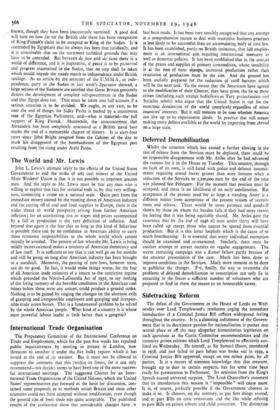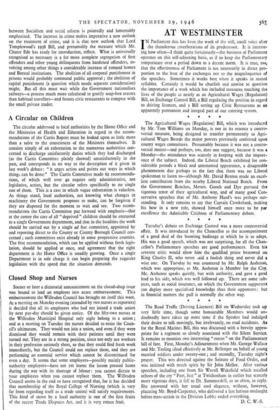Sidetracking Reform
The defeat of the Government in the House of Lords on Wed• nesday over Lord Templewood's resolution urging the immediate introduction of a Criminal Justice Bill reflects widespread feeling throughout the country. It is a damning indictment of the Govern- ment that in its doctrinaire passion for nationalisation it pushes into second place or off the map altogether humanitarian legislation on such questions as the Curtis Committee recommendatons and the extensive prison reforms which Lord Templewood so effectively out- lined on Wednesday. He himself, as Sir Samuel Hoare, introduced in 1938, and just failed to pass before war broke out in 1939, a Criminal Justice Bill approved, except on one minor point, by all parties. It is a matter of common knowledge that that measure, brought up to date in certain respects, has for some time been ready for presentation to Parliament. Its omission from the King's Speech caused universal surprise. The Lord Chancellor's statement that its introduction this session is " impossible " will cause more. It is, of course, perfectly possible if the Government chooses to make it so. It chooses, on the contrary, to put first things second, and to pass Bills on civic restaurants and the like while refusing to pass Bills on prison reform and child protection. The distinction between Socialism and social reform is pointedly and lamentably emphasised. The increase in crime makes imperative a new outlook on the treatment of crime, and it is that new outlook that Lord Templewood's 1938 Bill, and presumably the measure which Mr. Chuter Ede has ready for introduction, reflect. What is universally recognised as necessary is a far more complete segregation of first offenders and other young delinquents from hardened offenders, in- volving among other things a considerable increase of remand homes and Borstal institutions. The abolition of all corporal punishment in prisons would probably command public approval ; the abolition of capital punishment (a question which needs separate consideration) might. But all this must wait while the Government nationalises railways—a process much more calculated to gratify soap-box orators than habitual travellers—and fosters civic restaurants to compete with the small private trader.



































 Previous page
Previous page